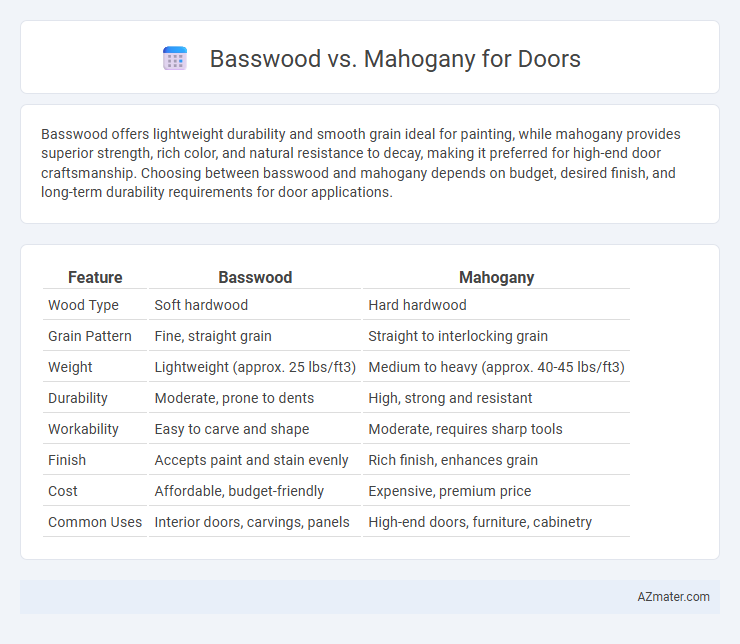Basswood offers lightweight durability and smooth grain ideal for painting, while mahogany provides superior strength, rich color, and natural resistance to decay, making it preferred for high-end door craftsmanship. Choosing between basswood and mahogany depends on budget, desired finish, and long-term durability requirements for door applications.
Table of Comparison
| Feature | Basswood | Mahogany |
|---|---|---|
| Wood Type | Soft hardwood | Hard hardwood |
| Grain Pattern | Fine, straight grain | Straight to interlocking grain |
| Weight | Lightweight (approx. 25 lbs/ft3) | Medium to heavy (approx. 40-45 lbs/ft3) |
| Durability | Moderate, prone to dents | High, strong and resistant |
| Workability | Easy to carve and shape | Moderate, requires sharp tools |
| Finish | Accepts paint and stain evenly | Rich finish, enhances grain |
| Cost | Affordable, budget-friendly | Expensive, premium price |
| Common Uses | Interior doors, carvings, panels | High-end doors, furniture, cabinetry |
Introduction to Basswood and Mahogany as Door Materials
Basswood is a lightweight, fine-grained hardwood known for its smooth texture and ease of carving, making it ideal for intricately designed doors. Mahogany is a dense, durable hardwood prized for its rich reddish-brown color and exceptional resistance to rot, commonly used in high-end, long-lasting doors. Both woods offer unique benefits, with basswood providing affordability and workability, while mahogany delivers strength and elegant aesthetics.
Physical Properties: Basswood vs Mahogany
Basswood features a lightweight, fine-grained texture with a uniform pale color ideal for carving, but it is softer and less durable than mahogany. Mahogany offers a denser, harder structure with rich reddish-brown hues, providing superior strength, resistance to wear, and natural stability against warping. When selecting materials for doors, mahogany's robust physical properties ensure long-term durability, while basswood is favored for its ease of workability and smooth finish.
Durability and Longevity Comparison
Basswood offers moderate durability with resistance to splitting and warping, making it suitable for interior doors that experience low to moderate use. Mahogany, renowned for its exceptional hardness and natural resistance to decay, excels in longevity and is ideal for exterior doors exposed to varying weather conditions. The dense grain structure of mahogany provides superior strength and lasting beauty compared to the softer, less dense basswood.
Appearance and Aesthetic Appeal
Basswood offers a light, uniform texture with a pale, creamy color that provides a clean and smooth surface ideal for painted finishes and intricate carvings, making it perfect for doors requiring a subtle and classic aesthetic. Mahogany features a rich, reddish-brown hue with a pronounced grain pattern, delivering an elegant and luxurious appearance that enhances doors with natural beauty and warmth. The choice between basswood and mahogany for doors depends on whether a soft, versatile look or a bold, traditional aesthetic is desired.
Workability and Ease of Customization
Basswood offers superior workability and ease of customization due to its soft texture and fine grain, making it ideal for intricate carvings and detailed door designs. Mahogany, while denser and harder, provides excellent stability and durability but requires sharper tools and more effort for precise cuts and customization. For DIY projects or intricate door features, basswood is preferred, whereas mahogany suits professional applications demanding robust and lasting finishes.
Resistance to Moisture, Pest, and Warping
Basswood offers moderate resistance to moisture but is more prone to warping and pest damage compared to mahogany, which is highly durable with excellent natural resistance to moisture, termites, and warping. Mahogany's dense grain structure provides superior stability in varied climates, making it ideal for exterior doors exposed to humidity. For longevity and less maintenance, mahogany outperforms basswood in resisting common environmental threats.
Acoustic and Insulation Qualities
Basswood offers superior acoustic dampening due to its soft, porous structure, making it ideal for doors aimed at reducing sound transmission. Mahogany, while denser and heavier, provides excellent thermal insulation and contributes to energy efficiency in door applications. When prioritizing soundproofing and insulation, basswood excels in noise reduction, whereas mahogany enhances thermal barriers.
Cost Differences: Basswood vs Mahogany Doors
Basswood doors generally cost less than mahogany doors due to the faster growth and wider availability of basswood, making it a budget-friendly option for interior and exterior doors. Mahogany, known for its durability and rich grain, commands a higher price point reflecting its premium quality and longevity. The cost difference can range from 20% to 50%, depending on the grade and source of the wood, impacting overall door installation and maintenance expenses.
Environmental Impact and Sustainability
Basswood is a fast-growing hardwood known for its low environmental impact due to sustainable harvesting practices and high renewability, making it an eco-friendly choice for doors. Mahogany, while prized for durability and rich appearance, often raises sustainability concerns because traditional sources involve slow growth and deforestation risks, though certified sustainable mahogany options exist. Choosing basswood can reduce carbon footprint and support forest regeneration, whereas selecting FSC-certified mahogany helps mitigate environmental harm without compromising aesthetics.
Which is Better? Final Recommendations
Basswood offers a lightweight, cost-effective option with excellent workability and resistance to warping, making it ideal for painted door surfaces in moderate climates. Mahogany provides superior durability, natural resistance to decay, and a rich, luxurious grain, suitable for high-end, solid wood doors in harsher environments. For budget-conscious projects favoring painted finishes, basswood is better, while mahogany excels in longevity and aesthetics for premium exterior doors.

Infographic: Basswood vs Mahogany for Door
 azmater.com
azmater.com